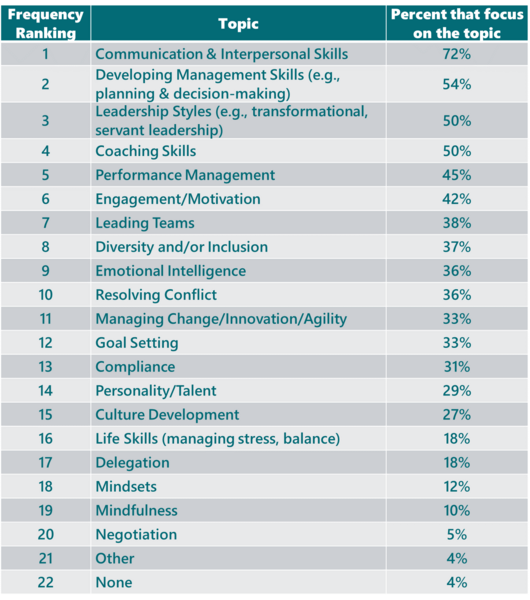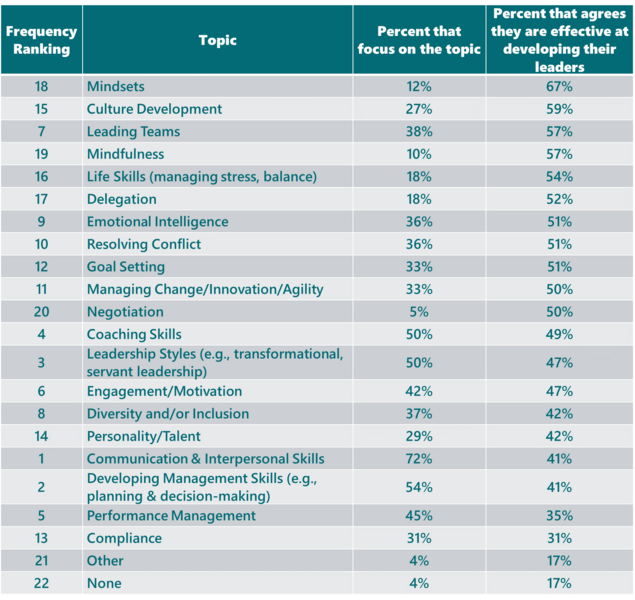ATD Blog
Making the Link Between Mindset and Effective Leadership Development
Wed Sep 09 2020

Bookmark
Have you ever wondered what topics most organizations focus on for their leadership development efforts and what topics translate into more effective leadership development?
I recently conducted a survey of 153 organizations’ leadership development efforts to answer these and other questions. The folks that responded to my survey all indicated that they are involved in their organizations’ leadership development efforts, with most having more than three years of experience in their organization. Organizations ranged in size from fewer than 100 employees to more than 100,000 employees, with most ranging between 100 and 5,000.
Overall Effectiveness of Leadership Development Programs
Before diving into the topics organizations most commonly focus on, consider the overall effectiveness of leadership development programs:
33 percent agreed or strongly agreed that their organization’s leadership development efforts are effective.
30 percent somewhat agreed that their organization’s leadership development efforts are effective.
37 percent did not agree that their organization’s leadership development efforts are effective.
This means that more than one in three organizations state that they are not effective at developing their leaders, and two in three cannot fully agree that they are effective at developing their leaders.
These results may not surprise you, but the reality of those numbers is concerning.
Leadership Development Topics
Respondents were provided with 20 general and common leadership development topics and were asked to select the topics that they focus on as part of their leadership development program. The topics most commonly focused on are communication and interpersonal skills (72 percent), developing management skills (54 percent), leadership styles (50 percent), and coaching skills (50 percent).

The Topics That Lead to the Most Effective Leadership Development
I then investigated this question: If an organization focuses on \_\_\_\_\_\_\_\_\_\_\_\_ (insert topic here), what percentage of these organizations agree or strongly agree that they are effective at developing their leaders. Here are the results:

This table reveals that the most frequently covered leadership development topics are not often associated with effective leadership development.
The topic most often covered that is associated with effective leadership development is mindsets. Only 12 percent of organizations focus on mindsets, but when they do, 66 percent of these organizations state that their leadership development efforts are effective.
Given this finding, I dove in to investigate the effectiveness of leadership development efforts if organizations do not focus on mindsets. Here are the results:

These results tell us two things:
1. When organizations focus on mindsets, they are more than twice as likely to rate their leadership development efforts as effective.
2. Given that most of the percentages in the second table are quite a bit higher than the 29 percent we see in this table, we can see that when organizations focus on mindsets, it surely isn’t the only topic they are focusing on.
Observing mindsets as being a topic that is so instrumental in leadership development effectiveness is interesting. But what is shocking is how few organizations focus on mindsets.
Why Mindsets?
These results may lead you to ask this question: What is there about mindsets that lead to effective leadership development?
It is important to start with what mindsets are. Many find mindsets to be fluffy ethereal concepts. But, that is far from the truth.
Formally defined, mindsets are individuals’ mental lenses that shape how they encode and process information, disposing them to certain ways of thinking and behavior. There are rich and deep academic literatures identifying various mindsets (for example, fixed and growth mindsets, goal orientations, or prevention and promotion mindsets) as being foundational to how people think, learn, and behave.
Focusing on mindsets may be vital to effective leadership development for at least three reasons:
1. Mindsets play two primary jobs in how leaders operate. First, since our senses send more information to our brains than we can process, our mindsets play the role of filtering select information into our brain for processing. Second, our mindsets then interpret that information in unique ways. These two jobs explain why two different leaders can encounter the same situation but respond to that situation differently.
2. Because of these two jobs, mindsets are effectively foundational to and dictate many of the other topics included in the lists above. For example, how a leader interacts with another, how they make decisions, and what leadership styles they engage in are contingent upon the quality of the leader’s mindsets.
3. Mindsets start to get us into the next frontier of leadership development: the mind. Until now, and as you will see with the topics most commonly focused on, most leadership development efforts have focused primarily on behaviors (such as, what do leaders need to do to be effective). When we focus on mindsets, we are not only focused on leaders’ doings, we are focus on their being.
The Cutting-Edge of Leadership Development
I believe that most organizations do not focus on mindsets because they do not understand what they are or the foundational role they play in how leaders process and operate. I also think most leaders don’t know what mindsets to focus on.
But those who do focus on mindsets are on the cutting-edge of leadership development.
I hope this research inspires you to integrate mindsets into your organization’s leadership development efforts.
To learn more, join me October 26-30, 2020, during the ATD Virtual Conference for the session, The Mind: The Next Frontier of Organization Development.
More from ATD

